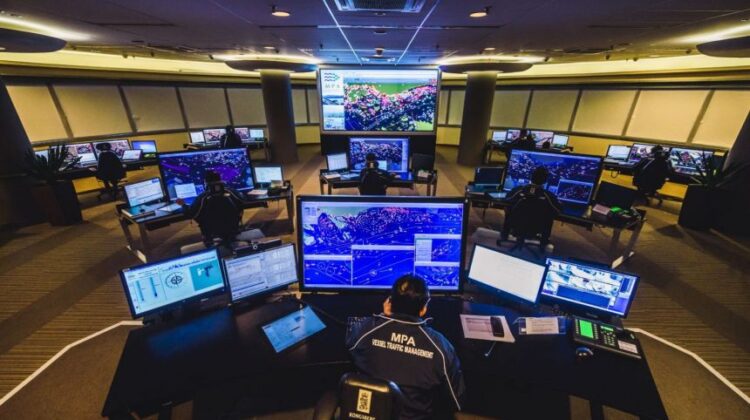
Digitalising the maritime sector to boost productivity and sustainability
From electronic bills of lading to digitalised port systems, the industry is tapping on technology to propel the sector into the future
SINGAPORE : At the Singapore Maritime Week (SMW) organised by the Maritime and Port Authority of Singapore (MPA) earlier this month, Minister for Transport Ong Ye Kung launched the second phase of MPA’s digitalPORT@SGTM.
This marked the latest major step in the digitalisation journey of Singapore’s maritime industry as it leverages digitalisation initiatives to further cement its position as a global maritime hub.
Since it was launched in 2019 to serve as a one-stop clearance platform for all vessel-related transactions, digitalPORT@SGTM has streamlined 16 different vessel, immigration and port health clearance forms into a single submission, saving the maritime industry an estimated 100,000 man-hours each year.
In this phase, digitalPORT@SGTM features a Just-In-Time (JIT) Planning and Coordination Platform for port users, including ship owners and agents, terminal operators and marine service providers. It will help to shorten the turnaround time of ships calling at the Port of Singapore, increase the port’s efficiency and reduce business costs.
Container liners can start to trial the JIT Platform. The platform will be extended to tankers and bulk carriers by the end of the year. When fully operationalised, the services can benefit over 2,000 maritime firms, and ships could shorten their port stays by a day or more.
Mr Leslie Yee, General Manager IT at Pacific International Lines who is participating in the use of JIT Platform, said: “In the first phase of digitalPORT@SGTM, our shipmasters and ship agents were able to submit, track and receive approval for arriving and departing vessels through the portal, simplifying the entire clearance process. We look forward to beginning phase two trials with MPA for greater port turnaround efficiency in real-time.”
By improving ships’ turnaround time, digitalPORT@SGTM will contribute to a reduction in their emissions in Singapore’s port waters.
How technology is transforming maritime trade
At the Singapore Maritime Technology Conference held during SMW, Senior Minister of State for Foreign Affairs and Transport Chee Hong Tat added: “We have to continue pushing for common data standards so that we can integrate networks and systems, and propel further adoption of digital solutions across global supply chains.”
One area of cross-border trade that could benefit from efficiencies arising from digitalised maritime documentation is the bill of lading, a legal document that serves as a receipt of goods received, document of title over goods in transit and evidence of the contract of carriage. Today, most cargo shipments still rely on physical bills of lading that are couriered and passed through many hands such as shipper, trader, financier before reaching the consignee, presenting it to take delivery of the said cargo.
In February 2021, the Electronic Transactions (Amendment) Bill was passed to recognise electronic bills of lading (eBLs) as the functional equivalent of the paper versions.
“This makes Singapore the second country in the world to adopt the United Nations Commission on International Trade Law (UNCITRAL) Model Law on Electronic Transferable Records, and the first major shipping and trading hub to adopt the Model Law into its local legislation. This legal framework provides the recognition of eBLs under Singapore law and illustrates Singapore’s readiness and confidence in both its maritime and legal sectors in embracing new technologies,” said Mrs Gina Lee-Wan, Partner and Co-Head of the Maritime and Aviation Practice at Allen & Gledhill and Chair of the Legal and Insurance Committee of the Singapore Shipping Association.
Having eBLs operate across different ecosystems is another strategy to accelerate adoption of digital cross-border trade. In January 2021, MPA partnered with the Port of Rotterdam Authority, Infocomm Media Development Authority (IMDA) and industry partners, namely Ocean Network Express, Olam International, #dltledgers and NaviPorta, to successfully trial an eBL for a shipment of processed cashews from Qui Nhon, Vietnam, to Rotterdam, the Netherlands, via transshipment in Singapore. The trial demonstrated that using an eBL in lieu of a physical copy slashed the documentation processing time from an average of six to 10 days to less than 24 hours.
To encourage wider use of eBLs, MPA, supported by IMDA and Digital Container Shipping Association (DCSA), issued a call-for-proposal to develop and pilot eBL solutions.
DCSA’s chief executive Mr Thomas Bagge said: “MPA’s dedication to promoting collaboration and furthering digital transformation of the industry is solidifying its position as the world’s leading port in terms of efficiency, effectiveness and innovation.”
Future of the maritime workforce
Looking ahead, maritime jobs could look quite different, given technological advancements and industry transformation.
For example, while ship owners and operators will continue to require support from ship agents at ports of call, digitalisation and automation could alter the way ship agents carry out their work. Customs clearances and document handling are becoming increasingly digitalised and streamlined, and repetitive document processing tasks are being supplemented with technology such as robotic process automation. On top of acquiring the skills and knowledge to operate in this digitalised environment, ship agents will also need to adapt their businesses in order to provide greater value-add to their principals.
Minister Ong added: “We are still at a nascent stage of fully leveraging the potential of digitalisation. These are powerful technologies and solutions, not just replacing old ones, but also seeking new problems to solve and new frontiers to break.”
While these developments will bring about exciting career opportunities, it would also result in potential changes to jobs and skills requirements in the industry. MPA will be conducting industry consultations with maritime companies to make maritime jobs more productive, attractive, and future-ready.
Source : THE STRAIT TIMES
